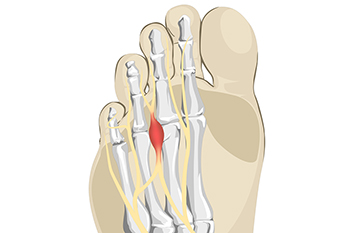Connect With Us
Items filtered by date: February 2024
Causes of Night Foot Pain

Every day, foot pain affects millions of people worldwide, ranging from dull aches to sharp stings. Some experience foot pain solely at night, disrupting their sleep quality. One common cause is plantar fasciitis, where the tissue running from the foot's front through the arch to the heel becomes inflamed, often worsened by factors like flat feet or tight calf muscles. Another foot pain culprit is Morton’s neuroma, which is characterized by pinching or inflammation around the nerves in your toes and can lead to burning or shooting pains. Pregnancy-related changes in calcium levels may cause leg and foot cramps. Diabetes can damage foot nerves due to high blood sugar levels. Fibromyalgia sufferers often experience widespread pain, including in the feet, exacerbated at night by low cortisol levels. Lifestyle factors and foot anatomy also contribute to nighttime foot pain. If you are experiencing persistent nighttime foot pain, it is suggested that you make an appointment with a podiatrist for a proper diagnosis and appropriate treatment.
Foot Pain
Foot pain can be extremely painful and debilitating. If you have a foot pain, consult with Ali Davis, DPM from The Foot Clinic. Our doctor will assess your condition and provide you with quality foot and ankle treatment.
Causes
Foot pain is a very broad condition that could be caused by one or more ailments. The most common include:
- Bunions
- Hammertoes
- Plantar Fasciitis
- Bone Spurs
- Corns
- Tarsal Tunnel Syndrome
- Ingrown Toenails
- Arthritis (such as Gout, Rheumatoid, and Osteoarthritis)
- Flat Feet
- Injury (from stress fractures, broken toe, foot, ankle, Achilles tendon ruptures, and sprains)
- And more
Diagnosis
To figure out the cause of foot pain, podiatrists utilize several different methods. This can range from simple visual inspections and sensation tests to X-rays and MRI scans. Prior medical history, family medical history, and any recent physical traumatic events will all be taken into consideration for a proper diagnosis.
Treatment
Treatment depends upon the cause of the foot pain. Whether it is resting, staying off the foot, or having surgery; podiatrists have a number of treatment options available for foot pain.
If you have any questions, please feel free to contact our office located in Overland Park, KS . We offer the newest diagnostic and treatment technologies for all your foot care needs.
The Significance of Practicing Everyday Foot Care

Practicing everyday foot care is an essential yet often overlooked aspect of overall well-being. The feet, our foundation for mobility, endure daily stresses and strains, making regular foot care a vital practice. By incorporating simple routines into our daily lives, such as washing our feet, moisturizing, and inspecting them for any signs of discomfort or abnormalities, we can prevent common issues like dry skin, fungal infections, and calluses. Wearing proper footwear that provides support and comfort is equally vital, as ill-fitting shoes can lead to a range of problems, from blisters to chronic conditions such as bunions. Regular toenail maintenance helps prevent ingrown toenails and other nail-related complications. Additionally, incorporating gentle stretching exercises and elevating the feet after prolonged periods of standing or sitting promotes circulation and reduces swelling. Prioritizing everyday foot care not only maintains the health and appearance of our feet but contributes to overall physical well-being. If you are seeking additional tips on effective daily foot care, it is suggested that you consult a podiatrist.
Everyday foot care is very important to prevent infection and other foot ailments. If you need your feet checked, contact Ali Davis, DPM from The Foot Clinic. Our doctor can provide the care you need to keep you pain-free and on your feet.
Everyday Foot Care
Often, people take care of their bodies, face and hair more so than they do for their feet. But the feet are a very important aspect of our bodies, and one that we should pay more attention to. Without our feet, we would not be able to perform most daily tasks.
It is best to check your feet regularly to make sure there are no new bruises or cuts that you may not have noticed before. For dry feet, moisturizer can easily be a remedy and can be applied as often as necessary to the affected areas. Wearing shoes that fit well can also help you maintain good foot health, as well as making it easier to walk and do daily activities without the stress or pain of ill-fitting shoes, high heels, or even flip flops. Wearing clean socks with closed shoes is important to ensure that sweat and bacteria do not accumulate within the shoe. Clean socks help to prevent Athlete’s foot, fungi problems, bad odors, and can absorb sweat.
If you have any questions please feel free to contact our office located in Overland Park, KS . We offer the newest diagnostic and treatment technologies for all your foot and ankle needs.
Morton’s Neuroma Explained

Foot pain, particularly sharp and stabbing sensations that ease when you stop walking and massage your foot, may indicate Morton's neuroma. Despite its intimidating name, this condition is typically harmless and very treatable. A neuroma, in simple terms, refers to the thickening of a nerve between the toes, usually between the second and third toes. Rarely, it can affect the space between the fourth or first toe. Morton's neuroma may also be called intermetatarsal neuroma, interdigital neuroma, Morton's metatarsalgia, perineural fibrosis, or entrapment neuropathy. Common symptoms can include sharp pain, numbness, tingling, burning, cramping, and a sensation of stepping on an object. Relief is often found by removing the shoe and massaging the foot. The exact cause of this nerve injury is unclear, but it may result from various factors, including foot structure, biomechanical abnormalities, and wearing ill-fitting shoes. Women aged 30 to 50 are more susceptible. Diagnosis involves a physical exam, including compression tests, and sometimes imaging such as X-rays, ultrasounds, or MRIs. To prevent Morton's neuroma, opt for well-fitting, comfortable shoes with wide-toe boxes, avoid high heels and narrow shoes, and consider orthotic inserts if needed. If you have pain in the area described above, it is suggested that you schedule an appointment with a podiatrist for a proper diagnosis and care.
Morton’s neuroma is a very uncomfortable condition to live with. If you think you have Morton’s neuroma, contact Ali Davis, DPM of The Foot Clinic. Our doctor will attend to all of your foot care needs and answer any of your related questions.
Morton’s Neuroma
Morton's neuroma is a painful foot condition that commonly affects the areas between the second and third or third and fourth toe, although other areas of the foot are also susceptible. Morton’s neuroma is caused by an inflamed nerve in the foot that is being squeezed and aggravated by surrounding bones.
What Increases the Chances of Having Morton’s Neuroma?
- Ill-fitting high heels or shoes that add pressure to the toe or foot
- Jogging, running or any sport that involves constant impact to the foot
- Flat feet, bunions, and any other foot deformities
Morton’s neuroma is a very treatable condition. Orthotics and shoe inserts can often be used to alleviate the pain on the forefront of the feet. In more severe cases, corticosteroids can also be prescribed. In order to figure out the best treatment for your neuroma, it’s recommended to seek the care of a podiatrist who can diagnose your condition and provide different treatment options.
If you have any questions, please feel free to contact our office located in Overland Park, KS . We offer the newest diagnostic and treatment technologies for all your foot care needs.
Do You Suffer From Painful Feet?
Blog Archives
- April 2025
- March 2025
- February 2025
- January 2025
- December 2024
- November 2024
- October 2024
- September 2024
- August 2024
- July 2024
- June 2024
- May 2024
- April 2024
- March 2024
- February 2024
- January 2024
- December 2023
- November 2023
- October 2023
- September 2023
- August 2023
- July 2023
- June 2023
- May 2023
- April 2023
- March 2023
- February 2023
- January 2023
- December 2022
- November 2022
- October 2022
- September 2022
- August 2022
- July 2022
- June 2022
- May 2022
- April 2022
- March 2022
- February 2022
- January 2022
- December 2021
- November 2021
- October 2021
- September 2021
- August 2021
- July 2021
- June 2021
- May 2021
- April 2021
- March 2021
- February 2021
- January 2021
- December 2020
- November 2020
- October 2020
- September 2020
- August 2020
- July 2020
- June 2020
- May 2020
- April 2020
- March 2020
- February 2020
- January 2020
- December 2019
- November 2019
- October 2019
- September 2019

